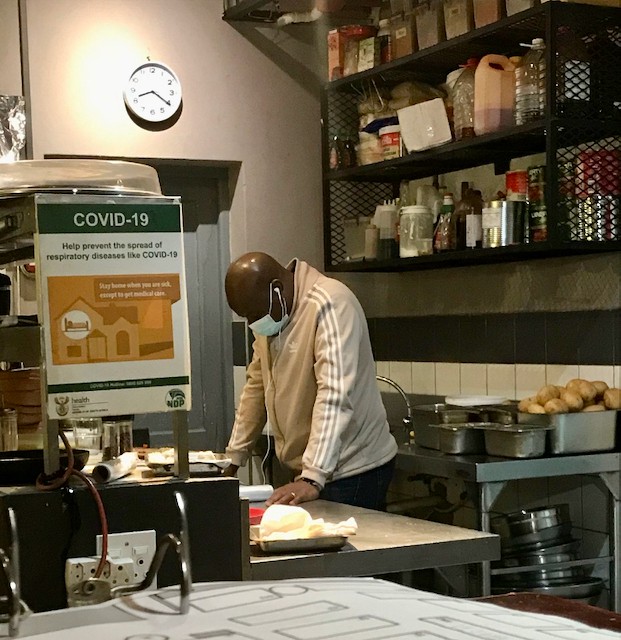Waiter loses job a second time because of the pandemic
Restaurant staff left without any income as SA goes back to Level 4
This restaurant manager’s body language says it all. This photo was taken at the Fat Cactus in Gardens, Cape Town, while watching President Ramaphosa’s address to the nation on Sunday night, when he announced that restaurants may now only serve takeaways. Photo: Kaylee Bush
- On Sunday the President announced that restaurant table service is once again prohibited because of the Covid-19 pandemic.
- Waiters and restaurant staff are once again left without an income.
- We spoke to a waiter who has lost his job for the second time due to the pandemic. He has a one-year-old baby to support.
- The Western Cape government has asked for the UIF TERS scheme to reopen to help businesses that cannot operate under the increased restrictions.
For the second time, Tatenda has lost a restaurant job because of the pandemic.
“I almost cried when President Cyril Ramaphosa announced the ban on Sunday night,” says Tatenda, who only wants his first name used.
He was working as a manager at Riverine Rabbit before it closed after the first lockdown last year. He then started to waiter at The Shop in Sea Point and at Bao Down in Cape Town. Bao Down is currently closed as it relocates to Green Point; it will reopen for takeaways but not yet table service after level 4 restrictions came into effect on Sunday. The Shop says it will not reopen.
Tatenda was working two shifts a week at each restaurant, from 5 to 10pm, making between R300 and R500 a day.
His wife gave birth to a boy during the hard lockdown in March 2020. “He came at the time I had lost my income,” says Tatenda. “My wife is working, but living on a single income is difficult. We are renting a one-bedroom flat in Goodwood for R6,800. We need R3,000 to pay the person who is helping with the baby and money for baby diapers, formula, electricity and groceries.”
“I was hoping to buy groceries this week when I got paid. We were looking forward to this week’s earnings to cover other expenses,” he said.
Tatenda feels the restrictions are too harsh. He thinks if social distancing rules were strictly enforced, alcohol banned and the space well ventilated, restaurants could have continued operating.
“Waiters are depressed. They are now sitting at home with no source of income. The morale is low. The government could also assist restaurants with relief funding to avoid closing down of restaurants,” he said.
On Monday, Western Cape Minister of Finance and Economic Opportunities David Maynier called for the national government to provide support for businesses whose operations are limited or shutdown by the adjusted Level 4 restrictions.
He said he had written to Minister of Employment and Labour Thulas Nxesi to re-open the UIF Covid-19 Temporary Employer-Employee Relief Scheme (TERS) scheme.
“Many businesses, particularly in the hospitality and liquor sectors, have already been hard-hit with significant job losses during the Covid-19 pandemic. Wine farms, restaurants and coffee shops cannot survive on takeaways alone. Two weeks of no income for these businesses, as well as cinemas, gyms, casinos, conferencing venues and theatres, will have a direct and sudden impact on people’s livelihoods, their ability to pay salaries, rent and buy food,” said Maynier.
This article was corrected as follows:
The sentence:
“Bao Down is currently closed after level 4 restrictions came into effect on Sunday”
was replaced with:
“Bao Down is currently closed as it relocates to Green Point; it will reopen for takeaways but not yet table service after level 4 restrictions that came into effect on Sunday.”
Next: We shouldn’t shift vaccines away from the elderly
Previous: Former political prisoner scratches out his image on Upington 26 monument in protest
© 2021 GroundUp. This article is licensed under a Creative Commons Attribution-NoDerivatives 4.0 International License.
You may republish this article, so long as you credit the authors and GroundUp, and do not change the text. Please include a link back to the original article.
We put an invisible pixel in the article so that we can count traffic to republishers. All analytics tools are solely on our servers. We do not give our logs to any third party. Logs are deleted after two weeks. We do not use any IP address identifying information except to count regional traffic. We are solely interested in counting hits, not tracking users. If you republish, please do not delete the invisible pixel.



